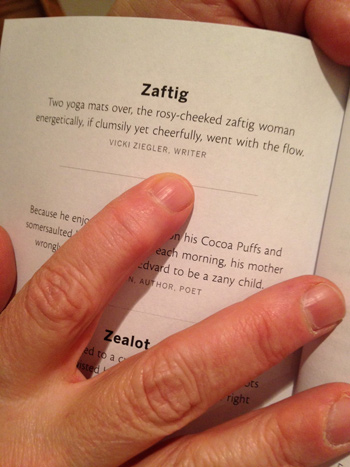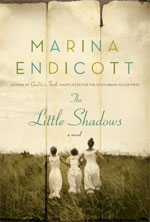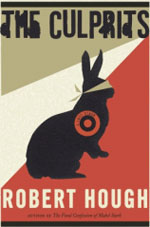Every year that you read is a good reading year. It doesn’t matter the subject, the format, the setting, the circumstances, the quantities, maybe even the quality, the company (or not), any of that … just read. You’ll be better for it.
Of course, the company often makes a wonderful difference. Whether it’s in person, silently, with other readers, or virtually, with others sharing oh, say, their poetry picks … it all enhances the experience. Combine that with an attentive partner who finds you books you didn’t even know you needed, and add a dash, or two, or more, of whimsy … and you have another astonishing year of words on the page or in your ears, taking you to amazing places.
Oh, and it’s not a competition … even if I do kinda keep track, and do kinda think 100 is a cool number on which to land at the end of the year. Here are some other things I kept track of:
Poetry works read: 58
Fiction works read: 34
Non-fiction works read: 8
Works reread: 11
Works by Canadian authors: 68
Works in translation: 4
Graphic novels: 2
Works read aloud (with partner): 1
Audiobooks: 10
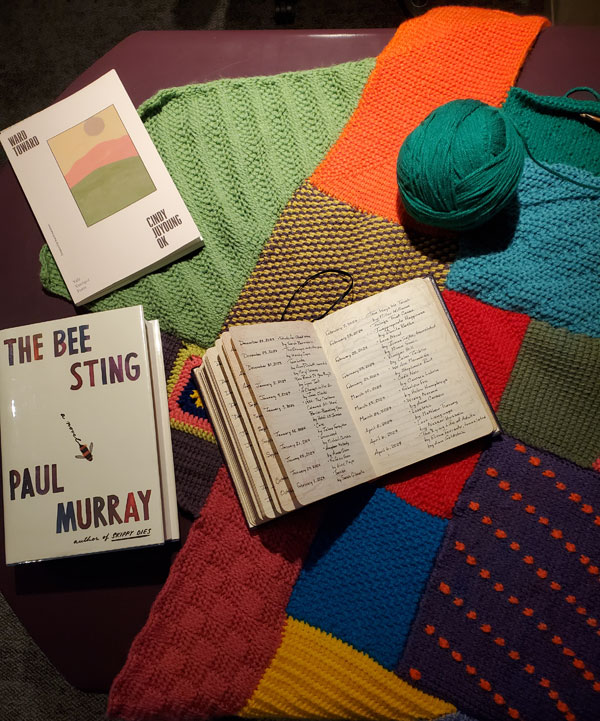
The silent book club reports I also feature on this blog always includes a combined list of what everyone in the group is reading. As I remark when I introduce those lists, every title on our group’s generous lists means that at least one (but usually more) readers have given that title thoughtful consideration. That doesn’t mean that every work on our lists is expressly recommended, of course. Without weighing in too heavily on my own list, I’ll just say the same: that inclusion on this list always means that I’ve devoted time and attention to a title. I think that means something, because for good or for bad (and we’ve discussed this a lot at sbc meetings), I rarely do not finish (DNF) a book I start. I know, I know … life’s too short, etc., etc. …
Anyhow, I’m just going to unfurl the list, in all its glory …
- You Break It You Buy It by Lynn Tait (2023 Guernica Editions)
- A Change in the Air by Jane Clarke (2023 Bloodaxe Books)
- 1934 – The Chatham Coloured All-Stars’ Barrier-Breaking Year by Heidi LM Jacobs (2023 Biblioasis)
- Care by Jaime Forsythe (2024 Opaat Press)
- Greenwood by Michael Christie (2020 McClelland & Stewart)
- Nobody by Anna Quon (2024 Opaat Press)
- Knife on Snow by Alice Major (2023 Turnstone Press)
- Service by Sarah Gilmartin (2023 Pushkin Press)
- The Ways We Touch by Miller Williams (1997 University of Illnois Press)
- Things That Cause Inappropriate Happiness by Danila Botha (2024 Guernica Editions)
- Love Novel by Ivana Sajko, translated by Mima Simic (2024 Biblioasis)
- Vinegar Hill by Colm Toibin (2023 Beacon Press)
- We Are Mermaids by Stephanie Burt (2022 Graywolf Press)
- Code Noir by Canisia Lubrin (2024 Knopf Canada)
- Ethel on Fire by Helen Humphreys (1991 Black Moss Press)
- Wrong Norma by Anne Carson (2024 New Directions)
- Lossless by Matthew Tierney (2024 Coach House Books)
- Love Language by Nasser Hussain (2023 Coach House Books)
- The Lying Life of Adults by Elena Ferrante, translated by Ann Goldstein (2020 Europa Editions)
- Rainy Day by Norma Cole (2024 knife|fork|book)
- She by Kirby (2024 knife|fork|book)
- A Year of Marvellous Ways by Sarah Winman (2015 Headline Publishing Group)
- The Year of Magical Thinking by Joan Didion (2005 Knopf)
- The Berry Pickers by Amanda Peters (2023 HarperCollins Canada)
- Sonnets from a Cell by Bradley Peters (2023 Brick Books)
- Hamnet by Maggie O’Farrell, narrated by Daisy Donovan (2020 Knopf Canada)
- Cabin Fever by Anik See (2024 Fish Gotta Swim Editions)
- Strange Sally Diamond by Liz Nugent (2023 Simon & Schuster)
- A Year of Last Things by Michael Ondaatje (2024 Knopf)
- Mobile by Tanis MacDonald (2019 Bookhug Press)
- That Audible Slippage by Margaret Christakos (2024 University of Alberta Press)
- The Art of Floating by Melanie Marttila (2024 Latitude 46 Publishing)
- Blood by Tyler Pennock (2022 Brick Books)
- The Covenant of Water by Abraham Verghese (2023 Grove Atlantic)
- The Life and Opinions of Tristram Shandy Gentleman by Laurence Sterne (1760)
- Northerny by Dawn Macdonald (2024 University of Alberta Press)
- ink earl by Susan Holbrook (2021 Coach House Books)
- Denison Avenue by Daniel Innes & Christina Wong (2023 ECW Press)
- Killdeer by Phil Hall (2011 Bookhug Press)
- Off the Tracks – A Meditation on Train Journeys in a Time of No Travel by Pamela Mulloy (2024 ECW Press)
- Doppelganger by Naomi Klein (2023 Farrar, Straus and Giroux)
- An Anthology of Monsters – How Story Saves Us From Our Anxiety by Cherie Dimaline (2024 University of Alberta Press)
- Her First Palestinian by Saeed Teebi (2022 House of Anansi Press)
- Loved and Missed by Susie Boyt (2021 New York Review Books)
- Falling Awake by Alice Oswald (2016 Jonathan Cape)
- The Size of Paradise by Dale Martin Smith (2024 knife|fork|book)
- The World Keeps Ending, and the World Goes On by Franny Choi (2022 HarperCollins)
- Beast Body Epic by Amanda Earl (2023 AngelHousePress)
- Incrementally by Penn Kemp (2023)
- Deviant by Patrick Grace (2024 University of Alberta Press)
- Remedies for Chiron by m. patchwork monoceros (2023 Radiant Press)
- a Baltic Friday early in grey by Adele Graf (2017 above/ground press)
- The Stairwell by Michael Longley (2014 Wake Forest University Press)
- Pinhole Poetry – Volume One Selected, edited by Erin Bedford (2023)
- Long Island by Colm Toibin (2024 McClelland & Stewart)
- The Long Defeat by Patrick Connors (2024 Mosaic Press)
- The Tradition by Jericho Brown (2019 Copper Canyon Press)
- I Made You a Mixed Tape by Dave Bidini (2024 West End Phoenix)
- At Marsport Drugstore by Al Purdy (1977 Paget Press)
- OBITS. by tess liem (2018 Coach House Books)
- Ruin by Neil Surkan (2023 knife|fork|book)
- Apples and Roses by Frances Boyle (2019 above/ground press)
- Siren by Kateri Lanthier (2017 Véhicule Press)
- Your tongue is as long as a Tuesday by Jay Besemer (2023 knife|fork|book)
- Pinhole Poetry – Volume Two Selected, edited by Erin Bedford (2024)
- The Albertine Workout by Anne Carson (2014 New Directions)
- Virgin by Analicia Sotelo (2018 Milkweed Editions)
- I Can Focus If I Try by Michael Flatt (2023 knife|fork|book)
- The Life of Tu Fu by Eliot Weinberger (2024 New Directions)
- Creeland by Dallas Hunt (2021 Harbour Publishing)
- No Meeting Without Body by Annick MacAskill (2018 Gaspereau Press)
- dayliGht by Roya Marsh (2020 MCD x FSG Originals)
- Crying Dress by Cassidy McFadzean (2024 House of Anansi Press)
- Disorder by Concetta Principe (2024 Gordon Hill Press)
- Look After Her by Hannah Brown (2019 Inanna Publications)
- 19 Ways of Looking at Wang Wei by Eliot Weinberger (1987/2016 New Directions)
- Widow Fantasies by Hollay Ghadery (2024 Gordon Hill Press)
- Held by Anne Michaels (2023 Knopf)
- Self-Esteem and the End of the World by Luke Healy (2024 Drawn and Quarterly)
- The Art of Dying by Sarah Tolmie (2018 McGill-Queen’s University Press)
- James by Percival Everett (2024 Doubleday)
- The Donoghue Girl by Kim Fahner (2024 Latitude 46 Publishing)
- Fleishman Is in Trouble by Taffy Brodesser-Akner, narrated by Allyson Ryan (2019 Random House)
- Satellite Image by Michelle Berry (2024 Wolsak & Wynn)
- Uncomfortability by Roxanna Bennett (2023 Gordon Hill Press)
- Leaving by Roxana Robinson, narrated by Hannah Choi (2024 W.W. Norton)
- May It Have a Happy Ending by Minelle Mahtani (2024 Penguin Random House Canada)
- Votive by Annick MacAskill (2024 Gaspereau Press)
- Parade by Rachel Cusk (2024 Faber & Faber)
- from time to new by Lydia Kwa (2024 Gordon Hill Press)
- The Trouble With Poetry by Billy Collins (2005 Penguin Random House)
- The Empusium by Olga Tokarczuk, translated by Antonia Lloyd-Jones (2024 Riverhead Books)
- Survivors of the Hive by Jason Heroux (2023 Radiant Press)
- Baby Cerberus by Natasha Ramoutar (2024 Wolsak & Wynn)
- Intermezzo by Sally Rooney (2024 Faber Books)
- Fire Weather by John Vaillant, narrated by Alan Carlson (2024 Knopf Canada)
- Songs for the Brokenhearted by Ayelet Tsabari (2024 HarperCollins Canada)
- Wintering by Katherine May, narrated by Rebecca Lee (2020 Riverhead Books)
- Small Things Like These by Claire Keegan (2021 Grove Press)
- On Beauty by rob mclennan (2024 University of Alberta Press)
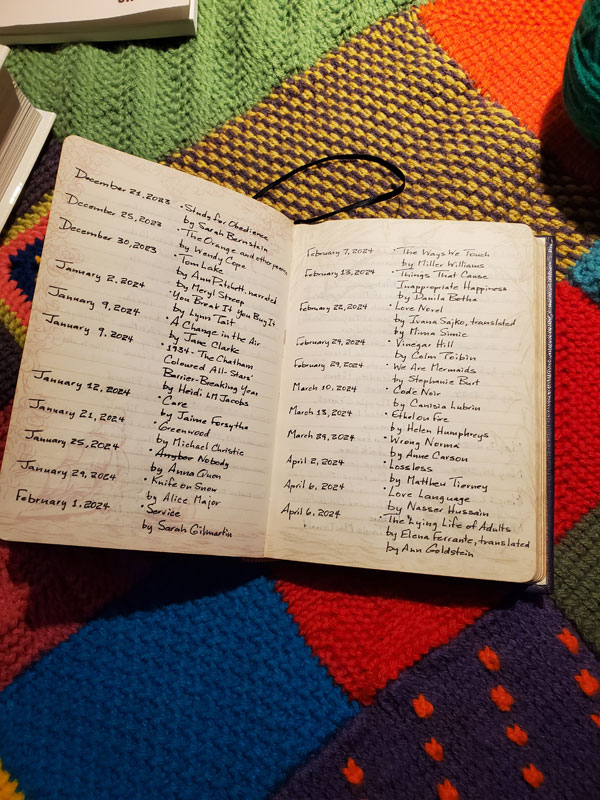
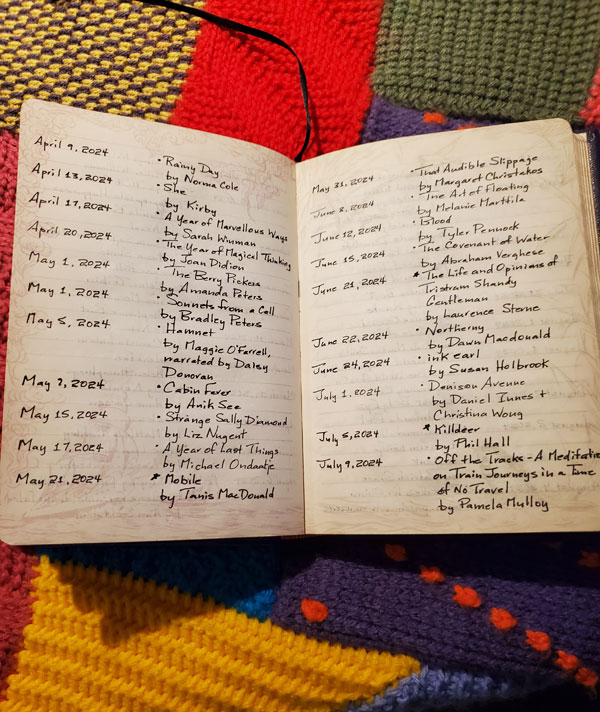
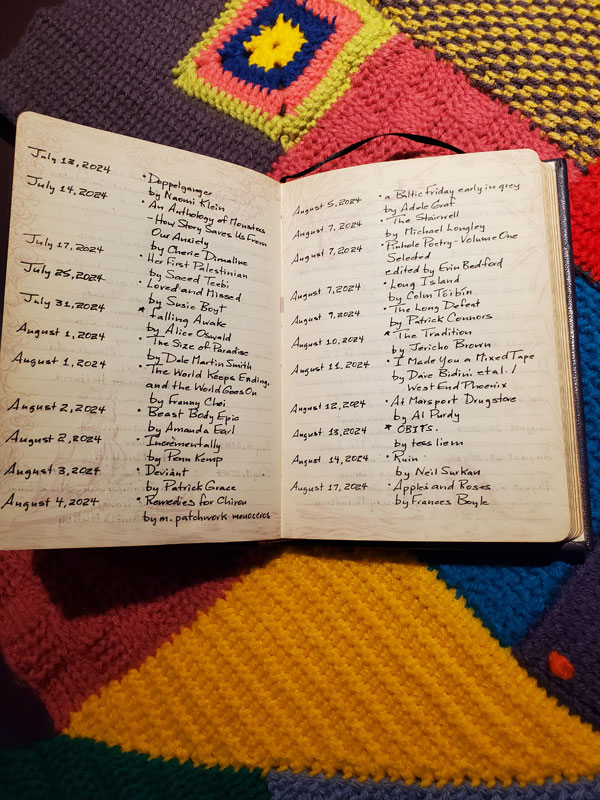
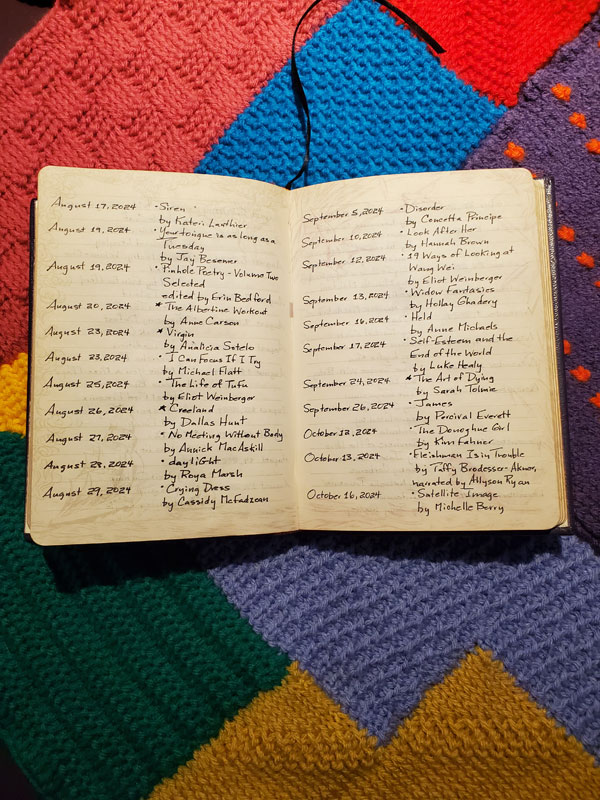
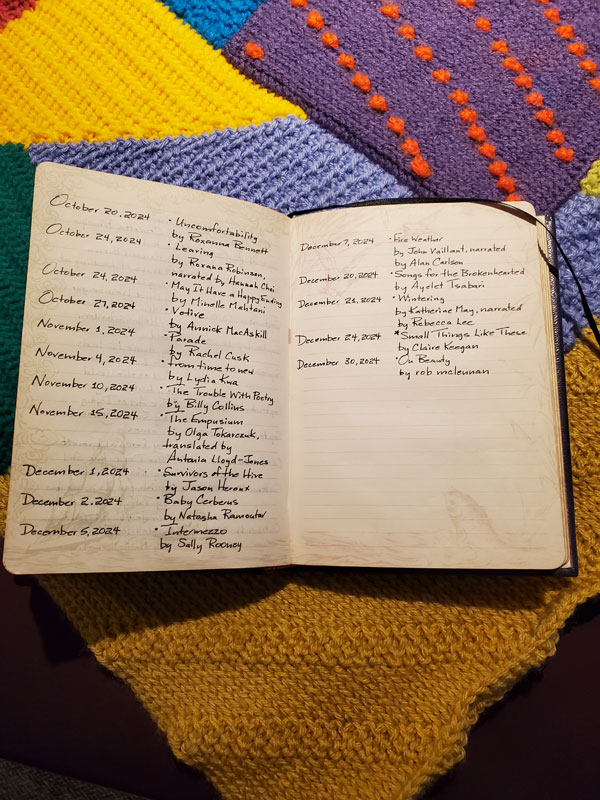

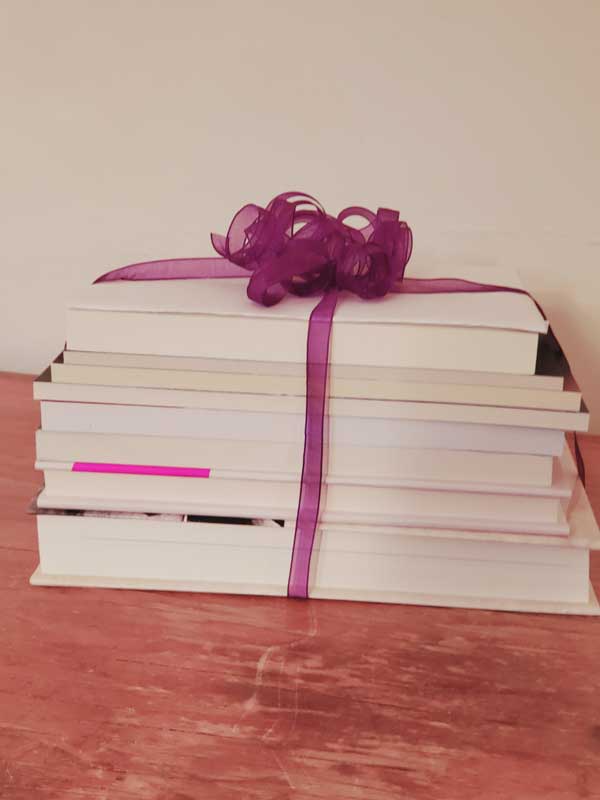

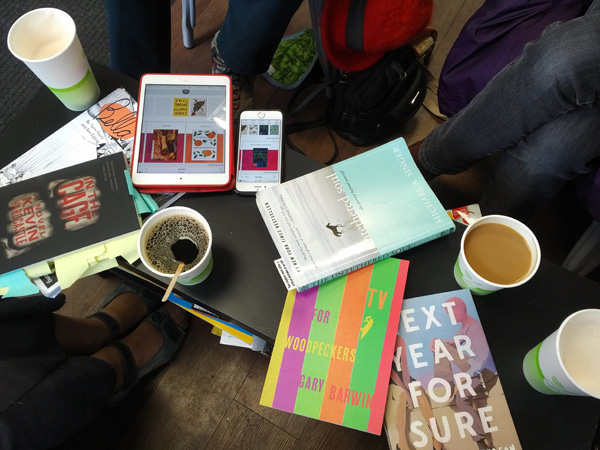
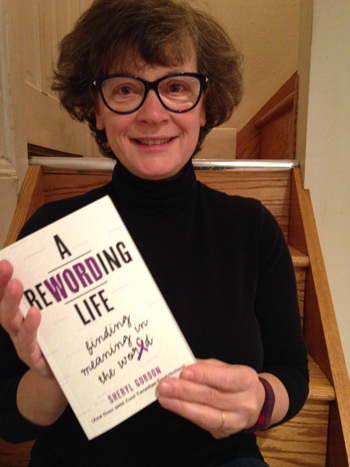 Many of the contributors are well known, including Yann Martel, Terry Fallis, Miriam Toews, Measha Brueggergosman, Tony Dekker, Emma Donoghue, Joel Plaskett and many more. Some of the contributors are, well, folks like me. Like many, I have family and friends who have been affected by dementia, so it feels particularly gratifying to try to strike back at it with the power of words.
Many of the contributors are well known, including Yann Martel, Terry Fallis, Miriam Toews, Measha Brueggergosman, Tony Dekker, Emma Donoghue, Joel Plaskett and many more. Some of the contributors are, well, folks like me. Like many, I have family and friends who have been affected by dementia, so it feels particularly gratifying to try to strike back at it with the power of words.